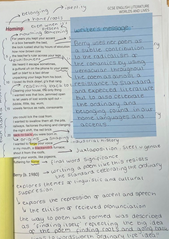We’re huge believers at the English and Media Centre in the value of group work – by which we largely mean group talk – as a crucial part of a balanced teaching diet. We feel it is particularly important to English teaching, given the centrality of interactive talk in language development as a whole. With this in mind, we’ve outlined below some of the reasons why we think it is essential to any informed, serious approach to linguistic and literary study.
1. Generating new knowledge
Knowledge is not just about facts but about ways of understanding and seeing the world. New knowledge often emerges from well-structured group interaction because it encourages seeing the world in different ways, hearing other perspectives and re-shaping one’s one in the light of these. The simple act of articulating a thought is part of this process: thought, after all, is not just expressed in language but comes into being through language. In working together, students can discover just how talk generates new ideas. Professor Neil Mercer, an expert in talk and group work, often shows this in action in sessions with teachers, asking them to think about a new idea on their own and then talk about it to discover how much further they get, proving the point about talk being a generator of ideas, not just an exchange of pre-existing ones.
2. Trying out new voices
'Flexibility in voice leads to flexibility in all things,' wrote leading British novelist Zadie Smith in an essay about the linguistic versatility of Barack Obama. Group discussions can encourage such flexibility by requiring students to take on roles that require them to use a voice other than their own. They begin to develop an understanding of the opportunities offered by adopting particular voices and to hear the potential of other voices. So taking on a chairing or facilitating role, for example, can give them the chance to test out voices more formal than those they use regularly with peers and family. Adopting the voice of a character from a novel, or of a different member of society, such as a teacher or an author, also provides them with the opportunity to experience using language in new ways
3. Preparing for writing
Speaking and writing are both generative activities (while listening and reading are receptive ones). The ideas generated in group talk can provide a range of alternative ideas to use in writing activities – ideas that might not come into being if dependent solely on individual thought. Group talk also enables students to rehearse what they are going to write. For example, they can develop the structure of an argument in conversation with others, before adapting this for their own use in a piece of writing.
4. Mirroring how language works
Language is a dynamic medium, with meaning established in dialogue. Group work allows students to experience first hand processes such as those of negotiation, clarification, contestation and modification that are all crucial elements of a healthy and vibrant approach to language use. This involves developing listening as well as speaking skills.
5. Understanding tone
Talking in groups offers a safe environment in which students can practise and experiment with their use of tone. They can experience at first hand that meaning does not just depend on vocabulary and sentence structure, but on the way that something is said, its context and purpose.
6. Skills for future life
In both Higher Education and all forms of future employment, students' ability to function effectively in groups will be of paramount importance to their success, as well as being vital in their lives as citizens, whether in their local communities, their leisure activities or their relationships with friends. Many job interviews these days involve group tasks for the very reason that the ability to work in a group is perceived as a highly significant skill for an employee. Neil Mercer’s work on successful group work in the classroom draws on his research on successful group activity in a range of work and other adult contexts. We have an obligation to our young people to give them experience of collaborative group work and teach them the skills that will allow them to work really well in a group.
7. Ethical English
In many ways this is the most important point, but is placed at the end because it is less to do with language and more to do with the function of talk in society as a whole. English teachers occupy a privileged position in taking on responsibility for the language development of students. As such, it is important to take into account how language is used in the outside world. Clearly this includes developing the ability to talk confidently and effectively in groups. Group work also develops several qualities that might be considered essential for the creation of a healthy, vibrant society, including those requiring collaboration, co-operation and mutual understanding. Indeed, the process of talking in groups might even be considered a crucial aspect of democracy itself.
Exploratory approaches
The promotion of group work as a useful approach to learning comes from sound research. As well as indicating that group work is a valuable part of any education aimed at academic success, it is also possible to draw conclusions from such research about other aspects of education that should be at the forefront of all our minds: is it humane? Does it prepare young people for life? Does it promote an ethos of collaboration and democratic participation? Perhaps we should have an additional question specific to English: does it open up or close down the possibilities offered by language?
The research also makes it clear that some group work is better than other group work, with ‘exploratory’ approaches proving the most effective for learning. 'Such talk,' Debra Myhill of the University of Exeter point out,
is characterised by pupils asking questions that require other pupils to offer opinions, make hypotheses, give reasons and reflect, and all members of the group working to create a shared understanding.
We keep this in mind at the English and Media Centre when designing resources that require students to work in groups. You can find three examples of such work here that you might like to try out or adapt for your own purposes.
- This activity, from our forthcoming GCSE publication, Sight/Unseen – Poetry, encourages students to explore what is really important about a poem. Designing it as group work exposes students to a range of different opinions and, interestingly, also incorporates whole class and individual work.
- This activity has gone down a storm with students using our Literary Shorts resources. It results in engaged dialogue about the merits of different short stories – and the end result is some quiet, informed individual reading.?
- This activity, from our award-winning Spotlight on Literacy, is great fun and shows that group work does not just have to involve discussion, but can also offer innovative ways to construct texts and then to think about how they have been put together.




